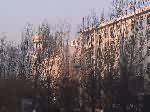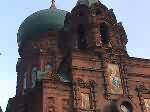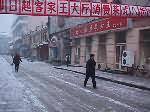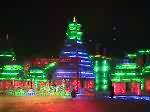- Getting around Lijiang. Dont stay in the Old Towns more than 2 days, there is nothing to do. KRISS Oct 9, 2013 05:46
- 2013 Beijing Temple Fair BENNYLAU Feb 26, 2013 03:29
- Malaysian traveling from KUL - LAX vis Shanghai PVG ZATI_DY Jan 3, 2013 20:15
The Light They’ve Chipped Out from the River
- Views: 5260
- |Vote: 0 0
- |Add to Favorites
- |Recommend to Friends
Dou Jiang
I used to be a café latte guy – sitting in a fancy café cradling a warm bowl of milky thick coffee on chilly days, believing I was immersed in the bosom of high culture, European style. Those winter days in Beijing when even the sky itself was freezing over indecisively, there I would be in a cushioned corner at Xingbake clinging to my illusions of haute couture in the form of a heavy mug of the closest equivalent to the taste of foreign coffee I could find. At more than 25 yuan a cup, it was more expensive than a smoking habit or a drinking habit; it was the quintessence of expat willful denial of the outside alien presence of a foreign land. With my latte in hand, I was on familiar turf.
Things have changed. There's an arrogance about expats that started to sit uncomfortably with me, something I wanted to distance from myself. Those mornings in remote towns, small marketplaces full of boisterous commoners and the echoes of their bartering resounding from the marble walls, crouching on a shin-high stool over a knee-high table laden with fresh, flavoursome, impossibly cheap breads and dumplings – those were the times when I was touched by real, living culture, when I began to mourn my milk coffees no longer and start to seek out something more in keeping with my surroundings.
I'm now a foreigner in constant search of dou jiang – a bean drink with a smoky kick that can cost all of two yuan a hot, steaming bowl. Add a dessert spoon of white sugar, and I get that latte feeling all over again, except this time the soundtrack isn't vacuous jazz-pop and noxious expat conversation, but roosters, motors, bickering, and the constant clack of china spoon on plastic plate like the striking of gongs.
The story of how I first came across dou jiang ties in with my first experience of the frozen North – in Harbin city, capital of Heilongjiang province. Heilongjiang is an extraordinary place, the intermediary between China and the remotest wastelands of Russian Siberia. If China is naturally isolated by the Himalayas to the Southeast, the Gobi Desert in the Northeast, and the Pacific Ocean in the Southwest, then it is cut off by the icy, barren wilderness to the North above Heilongjiang. Part of China's industrial Northeast, it's a solemn and hardened heartland of serious working men who know how to hold their liquor, and tall, ebony-haired, striking women with coal-black eyes and soft cheeks blown red in the freezing air. Heilongjiang is China's winter fairyland on the scale of the spectacular, vast plains of crisp snow and glacial peaks cut through by the great Northern river from which the province derives its name: the River of the Black Dragon. It has been likened to the Canadian wildlands, it is also the Chinese home of the Siberian White Tiger; it has been coveted and invaded by both Russia and Japan for its industrial potential and strategic location, it is China's hard-won bitter treasure at the country's crown.
In the Chill of Night
The central jewel in that crown is Harbin City. Famous in the summer for its Sun Island natural sauna resort on the banks of the Songhua River, it is far better known in the winter for its ice lantern festival, a time when the whole city is transformed into a crystalline labyrinth of sculptures in ice. Many cities hold ice sculpture exhibitions in the winter, but only in Harbin do the artworks extend beyond the boundaries of the display venues and spill over onto every street – walk around Harbin in the winter and all the streetlamps you'll pass are pillars of ice; shop fronts have erected frozen archways and in some areas the shops themselves are glassy ice igloos. Many are put together with ice bricks, others are carved into exquisite designs. Banks set ice lions in front of their main entrances to replace the traditional stone, and in public places extraordinary statuettes stand proudly on display - the delicate genius-work of handpick on the frozen water-ice of the Songhua.
When I told friends I was headed for Harbin, I was met with stares of disbelief. It wasn't that they didn't appreciate the attractions of the ice festival – the event is high on the list of China's winter destinations for many local Chinese – but that they couldn't believe I'd be prepared to face the cold. At an average of minus forty degrees centigrade, even your beverage might freeze before you finish drinking it. Given that Chinese people seem to fear the cold more than anything else, I was strongly advised to reconsider my decision. In the least, I was reminded again and again: wear as many clothes as possible. By the time my train arrived at Harbin station at 4.00 in the morning, I was puffed out in three T-shirts, two long-sleeve shirts, a woolen pullover and a snowjacket. I stepped out onto the station platform into the icy night air – uncomfortably warm. Out in the middle of Harbin's winter at the coldest time of night, I walked across the station yard feeling much too hot. For future reference: wrap up warm in Harbin, but don't overdo it...
There's an odd vibe in Harbin even at night when no one would dare to come outside in those ridiculous temperatures. Harbin was developed by Russian imperialists with their eye on North China; at the turn of the last century, Harbin was principally a Russian town founded on an old, Manchurian fishing village. It shows: the same kind of onion domes that you'd see in Moscow aren't uncommon in Harbin – indeed, many buildings betray their European architecture with hybrid refurbishments, but the original flavour does remain. Visit the St. Sofia Russian Orthodox church with its onion spires and European arches and you wouldn't think you were in China. No longer a place of worship, inside is an historical photo exhibition featuring many pictures of blond, blue-eyed caucasians picnicking on Harbin's grassy fields of long ago. You'll also see images of the Japanese era following their invasion of the Northeast – a regime that culminated in one of Japan's most notorious war crimes, the vivisection of human subjects used as ‘kindling' in experiments with biological weaponry. Nowadays in Harbin, there's still something of the feeling of those pre-Japanese pioneering times. Harbin is still a place to take bread with vodka and thick, malty beer.
The 24 Hour Temple
With my time in Harbin limited, I had wondered how to see the ice lantern display at night, given that at 7.00pm the same day I'd have to leave. My original plan had been to blindly hope that the lights would be left on all night, and to walk through the park at four in the morning to admire the sculptures. It was a crazy assumption, without any basis in reality – half an hour of wandering Harbin's odd, frozen, near-empty streets later, I came across the Zhaolin Park main entrance, chained at its cold metallic lock and entirely unilluminated. I rattled the gate hopelessly and woke up a grumpy guard. Ludicrously, I asked if he could let me in and turn on the lights, and he regarded me suspiciously, wondering whether it was my insanity or audacity that was abnormal. I explained my situation to him and he reminded me that Harbin's winter sun sets at 4.30pm – being as it is so far North – and that I'd have plenty of time to see the display in the afternoon dim.
I was relieved, but still left in the streets in the darkness with nothing to do. Nothing was open, and it was cold. The human body, I discovered, has a particularly good resistance to cold temperatures, especially with the additional protection of silly amounts of clothing – but this ability has its limits. After a couple of hours in the half-light, the quaint old sidestreets and unending rows of ice prism shapes were coming askew, and everything in my body was chilling thick – sometimes travellers overestimate how much punishment they can put themselves through, and I was beginning to see that my plan of walking through Harbin's night, underslept and overtired, was a stupid one.
It was then, just as the sun was edging into the day and Harbin's snow skies were taking on their grayish hue of dawn, that I spotted a small lane with a sign with the number 24 written in large numerals: I correctly guessed they were an all-hours eatery, and headed straight for them.
The restaurant was relatively bare, large, white walls with great, yellow plastic tables. I stood at the counter looking dejectedly at the menu, trying to figure out even the few characters I had learnt, but found my brain had also frozen over. But there was, not far from me, a great cauldron full of a steaming, straw-coloured liquid that was emitting a powerful, sweet, calming aroma. I couldn't resist and was soon served a bowl of thick, sweet dou jiang that found its warm, delicious path into my every vein. The taste was so pure that I felt like I was in a temple.
Afterword – Prosepoetry from '33 Cities'
** Most people who write about Harbin talk about the Ice Lantern Festival to the exclusion of everything else that's wonderful about Harbin. In this article I have tried to express some of the unique emotional terrain that lies in waiting for its explorers of the heart. However, I can't get away with saying nothing about the festival itself and have decided to append the following extract from an old prosepoem I wrote which talks about Harbin. This is the feeling I received from the city, and one of my most vivid memories of China. **
__________________________________________________
Just to see the light they've chipped out from the river, made something like a city in Zhaolin Park. Place the hand on the bright blocks, fan the fingers in their glove. Smooth, clear, dry to the touch, towers the size of towers, sculpted faces, refracting light and neon and the sparkling of the lamps behind. Their skin takes on highlighter shades, their breath too cold even to smoke out and in their anoraks over thick jerseys they've all come out to huff and peer.
Even outside the park, everywhere is crystal form and electric bright. When the sun comes, its concrete light casts gray onto the snow, and the market holds another affair of animal hide hats, black in the melted wet.
This China of spirit-strength beer and bread and broth. Past an onion dome, the horse carriage over the Songhua River, or on camelback, and it's glorious, and the strawberries even crack between the teeth, and the lemon-colour coffee is a syrup of sweet bean.







 Copyright © 1998-2026 All rights reserved.
Copyright © 1998-2026 All rights reserved.
1.
Dec 16, 2005 02:59 Reply
LEMONCACTUS said:
A brilliant read, love your prose poem Mishen.
2.
Sep 3, 2005 06:32 Reply
RITA said:
Wow, Heilongjiang is my hometown, but I used to play beside White Dragon River :)